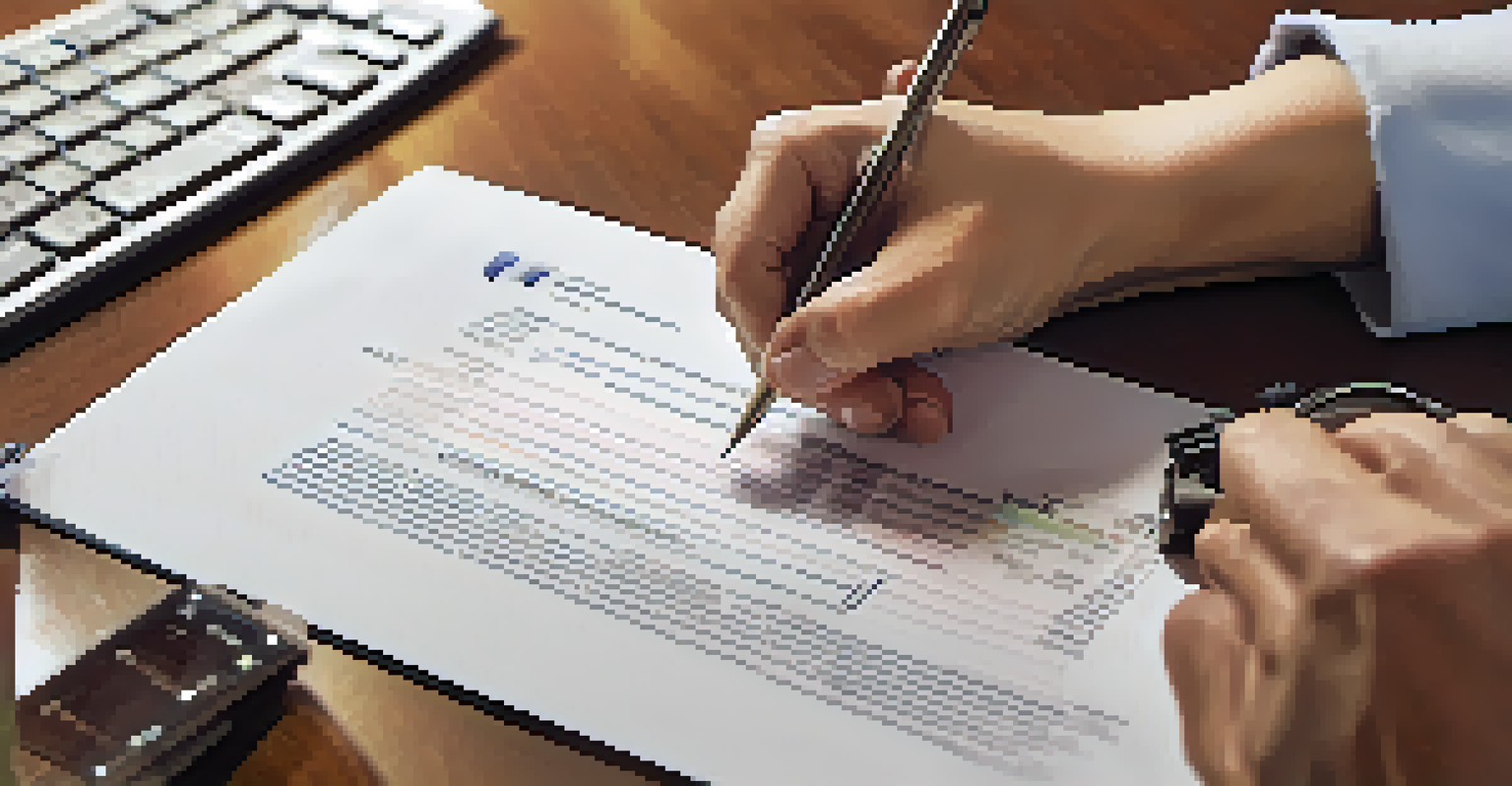Understanding the Closing Cost Process: A Timeline

What Are Closing Costs and Why They Matter
Closing costs are the fees and expenses you incur when finalizing a real estate transaction. They typically cover a variety of services, such as title searches, inspections, and loan processing fees. Understanding these costs is crucial because they can significantly affect your budget and overall home purchase experience.
The best time to buy a home is always five years ago.
These costs usually range from 2% to 5% of the home's purchase price, which means on a $300,000 home, you could be looking at $6,000 to $15,000 in closing costs alone. Knowing this upfront helps you plan better and avoid surprises down the road. It’s all part of ensuring a smooth transition to your new home.
In essence, being informed about closing costs can empower you as a buyer. It allows you to negotiate better and secure your financial future. Let’s dive deeper into the timeline of these costs, so you know what to expect at each step.
Initial Home Buying Steps and Cost Expectations
The journey begins with the home search, but don’t forget to consider initial costs like earnest money and inspections. Earnest money is a deposit that shows you're serious about buying, typically around 1% of the purchase price. This amount is usually credited toward closing costs later, but it’s essential to have it ready to go.

During this phase, you might also want to get a pre-approval from a lender. This not only helps you understand your budget but also gives you an idea of any upfront costs you'll need to cover. Knowing these early on can help you avoid any financial hiccups as you move forward.
Closing Costs: Know Your Budget
Understanding closing costs, which can range from 2% to 5% of the home's purchase price, is crucial for effective budgeting in your home-buying journey.
Staying organized during this stage is key. Create a checklist of potential costs, which will help you stay aware of what lies ahead. With the right preparation, you can enter the home-buying process with confidence.
Understanding the Loan Estimate Document
Once you’ve selected a lender, they will provide you with a Loan Estimate document. This crucial piece outlines your loan terms, including interest rates and an itemized list of closing costs. It’s a great tool to help you grasp what you’ll owe and how much your monthly payments will be.
Real estate is not just about property; it’s about people.
Take the time to review this document carefully. It breaks down fees like origination charges, appraisal fees, and title insurance. Understanding these components can help you identify areas where you might negotiate or shop around for better rates.
Remember, the Loan Estimate is not just a formality; it’s your financial roadmap for the closing process. Keep a copy handy for reference as you navigate the home buying journey.
Navigating the Home Inspection Stage
The home inspection is a critical part of the buying process that can also impact closing costs. This phase typically involves hiring a professional to evaluate the condition of the home, which can cost anywhere from $300 to $500. It’s an investment that can save you from costly repairs down the line.
If the inspection reveals significant issues, you may need to negotiate repairs with the seller. Depending on the terms, this might adjust the closing costs, as the seller could offer a credit to cover some of these expenses. Being proactive here can lead to substantial savings.
Key Documents: Loan Estimate & Disclosure
Reviewing the Loan Estimate and Closing Disclosure documents ensures you understand your financial commitments and can prepare for any changes before closing day.
So, while inspections may seem like an additional hurdle, they are essential for protecting your investment. They provide not only peace of mind but also leverage in negotiations, ensuring you're getting a fair deal.
The Role of Appraisals in Closing Costs
Next up on the timeline is the appraisal, an assessment of the property's value based on various factors. This step is often required by lenders to ensure they're not lending more than the home is worth. Appraisal fees typically range from $300 to $700, depending on the property's size and location.
Understanding the appraisal process is vital, as it can affect your loan amount and ultimately your closing costs. If the home appraises lower than the purchase price, you may need to renegotiate with the seller or come up with more cash to cover the difference.
In the grand scheme, appraisals serve as a safeguard for both buyers and lenders. They help to maintain market integrity, ensuring everyone is on the same page regarding the property's value.
Finalizing Your Loan and Closing Disclosure
After the appraisal, the lender will finalize your loan, and you’ll receive a Closing Disclosure document. This document is sent to you at least three days before closing, detailing your loan terms and final closing costs. It’s a crucial time to review everything and make sure it aligns with your Loan Estimate.
Pay close attention to any changes in fees or terms. This is your opportunity to ask questions and clarify any uncertainties before the big day. A thorough review can prevent last-minute surprises and ensure you’re fully prepared.
Home Inspection: Protect Your Investment
A thorough home inspection can reveal potential issues and may influence closing costs through negotiations with the seller, ultimately safeguarding your investment.
Remember, the Closing Disclosure isn’t just paperwork; it’s your final chance to understand your financial commitment. Take the time to digest this information, as it will set the stage for the closing process.
Closing Day: What to Expect
Closing day is the culmination of your home-buying journey, and it can be both exciting and overwhelming. You’ll be required to sign a pile of documents, including the deed and mortgage agreement. It’s also the moment when you’ll need to bring your closing costs, which can be in the form of a cashier's check or wire transfer.
At this point, all parties, including the seller, real estate agents, and often a closing agent, will be present to finalize the transaction. It’s essential to review all documents carefully and ask questions about anything you don’t understand. This ensures you're fully aware of your obligations as a new homeowner.

Once everything is signed and the funds are transferred, you’ll receive the keys to your new home. It’s a moment of celebration, marking the end of the closing process and the beginning of your new adventure.
Post-Closing: Understanding Your Responsibilities
After closing, you might think you can sit back and relax, but there are still responsibilities to consider. For instance, you’ll need to set up utilities, homeowners insurance, and property taxes. These are ongoing costs that are important to factor into your budget.
Additionally, it’s wise to keep all your closing documents in a safe place. These documents include your mortgage agreement and Closing Disclosure, which you may need for future reference. They’re essential for understanding your financial commitments and for tax purposes.
In conclusion, understanding the closing cost process and timeline is crucial for a successful home purchase. By staying informed and organized, you can navigate this complex journey with confidence and ease.